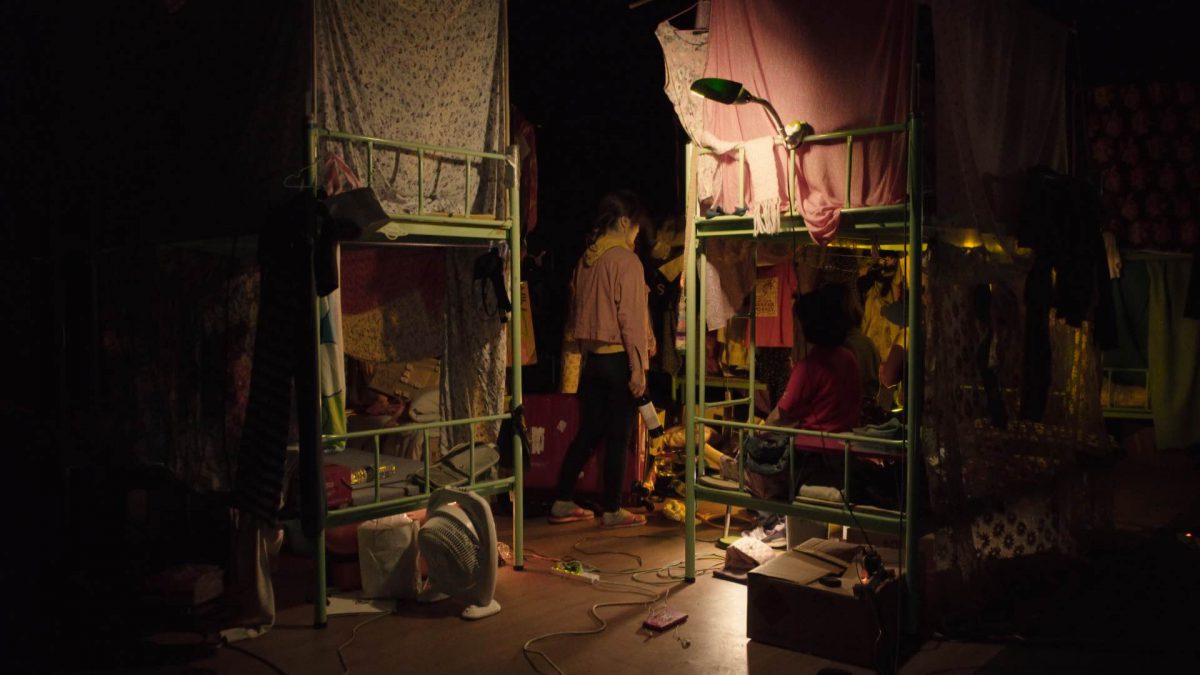Film Criticism Workshop
Blurred Lines
Dorm by So Yo-hen

Dorm begins by revealing its monster.
At first glance, it’s just another bunk bed in the dormitory. But with a switch and a prayer, it transforms: hands and feet stretch out from within the bedframe, its skin an amalgamation of metal, plastic, and cloth, its body made of hidden possessions. Its presence is a declaration: we are in another dimension.
Bordering on fiction, Dorm explores the life of female Vietnamese workers in a communal dormitory. There are rules here: everything is public, your bed is the only thing you own, and silence is a form of respect for others. Within the dimly lit space and walls made of beds, the film traces the lives of the women as they help a newcomer assimilate into the space, contemplate staging a workers’ strike, and prepare a theater piece: improvising dialogue, practicing lines, creating set pieces, and directing one another. The perpetual darkness and the close proximity of the individuals in the scenes prevent the audience from noticing any temporal progression.
The camera remains static and steady throughout most of these scenes, with some closeups and quick cuts to show the art and the faces behind them. Every now and then, there are sudden movements that tether us to reality—a pan that happens too early or a quick change in angle—inadvertently announcing the existence of an unseen observer. As the film progresses and culminates in a violent upheaval, it sheds its fictional elements in exchange for cinema verite: using framing and architecture to obscure the aggression, careful not to dehumanize its subjects further.
In the final ten minutes of the film, it opens up: the light pours in from the ceiling, opening up to a wide shot of an entire warehouse that reveals the dormitory to be a stage, its occupants workers who are reenacting their own experiences for the camera, performing their pain for others to witness. As the activists march out, and the other workers are left behind, we are left to make sense of the aftermath of the image.
There are many ethical limits to documentary films: How do you remain truthful without being exploitative? How do you create a narrative without crossing too many boundaries or disrespecting privacy? What are the responsibilities of the filmmaker in the face of suffering? In such circumstances, when the strikes are illegal in Vietnam and the working conditions brutalize individuals, there are too many risks that compromise the subjects if the form adheres strictly to the cinema verite demanded by “traditional” documentary.
Documentary fiction allows space for these limits to be addressed because documentary is not reality itself, but a reflection, refraction, and reconstruction of an accumulation of experiences. Role-playing has been used countless times to prepare women for the harsh world to come and to protect them from the shock and the unexpected aftermath of violence. Like in director So Yo-hen’s previous film Gubuk (Hut), theater becomes a way to reclaim narratives of oppression, performance a way to process trauma, and film a way of enabling and capturing this progress.
By blurring the lines between documentary and fiction, Dorm is in service of larger truths. In the words of one of the women: “These pictures were drawn by others, but the issue is everyone’s.” Regardless of whether what we are witnessing is purely fictional or not, these larger systems of exploitation are very much rooted in reality, and their effects are still felt by those around them. The hybrid format allows a form of cinematic atonement, a chance for these women to rewrite their lives and the way they are treated by these systems that seem immovable and unchangeable, at least on film.
In acclaimed writer Leslie Jamison’s essay collection The Empathy Exams, she examines how different experiences shape our definitions and practices of empathy. In her essay “The Lost Boys,” Jamison examines the role of documentaries in the development of empathy. She writes: “If it’s all edited anyway, if it’s all artifact, couldn’t it take another turn? Couldn’t there be another ending?”
Turns out, there can be. Dorm is proof of that.
Jason Tan Liwag
